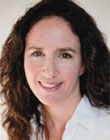2011 Janet Taylor Spence Award
Daphna Shohamy
Columbia University
 What is the focus of your award-winning research?
What is the focus of your award-winning research?
My research aims to understand how we learn from experience, how we use what we learn to guide decisions and actions, and how this happens in the brain. Within this broad context, some of the specific questions motivating my work are: When are decisions guided by explicit knowledge and when by implicitly learned associations or biases? Are explicit and implicit memories supported by independent cognitive and neural systems (as popular view suggests)? Or, is there some form of cross-talk between them?
I address these questions using an integrative approach that draws broadly on psychology and neuroscience to make predictions about cognition. Predictions are tested in behavioral and neuroimaging studies in healthy individuals and in patient populations with isolated damage to specific brain systems. Imaging studies tell us about the spatial and temporal characteristics of neural and psychological mechanisms. Neuropsychological studies augment this approach and provide direct evidence of the necessity of a system for specific cognitive processes.
By integrating imaging and patient studies, my work has shown how multiple brain systems for learning interact and jointly modulate our representations of the world. This suggests that the popular “dual-system” view of memory may be over-simplified and raises questions about the different ways in which we learn about the environment and how we use what we learn to make decisions.
How did you develop an interest in this area?
My interest in this area was shaped as much by circumstances as by inherent interest. I have always been intrigued by the idea that our brains, and our selves, are flexible, malleable, and dynamic; and that our everyday experiences, both big and small, have a long-term impact on who we are and what we do. Beyond these broad interests, in reality, circumstances have played an enormous role in each decision, each project, each collaboration. Understanding how this happens — how circumstances affect our choices — is at the heart of the scientific challenge I have been trying to address.
Who are your mentors and/or biggest psychological influences?
This is too good an opportunity to pass up, so I have to first mention my parents (how often do we scientists get to thank our parents?). My parents taught me, in many different ways, that one’s career should be challenging, interesting, and pleasurable. In science I consider myself fortunate to have had inspiring and supportive mentors and colleagues. I did my graduate work with Mark Gluck at Rutgers University; my postdoctoral mentor was Anthony Wagner at Stanford University. Everything I have done and continue to do has been heavily influenced by what they taught me both about science as well as what it means to be a mentor in the truest sense of the word.
My research has been and continues to be collaborative, not only because of the interdisciplinary nature of the methods I use, but because it is my experience that working with smart and talented people is more fun and leads to better science. Some of the individuals who have had a particularly strong influence on my work are Catherine Myers, Rutgers University, Russ Poldrack, University of Texas at Austin, Nathaniel Daw, New York University, Alison Adcock, Duke University, Natasha Kirkham, Birkbeck, University of London, and Tor Wager, University of Colorado at Boulder. One of the most exciting things about having my own lab is the opportunity to mentor my own students and postdocs and to learn from them, which has been incredibly satisfying.
What unique factors have contributed to your early success?
I love what I do and I love the challenges in this line of work. When I started graduate school I was interested in understanding the flexibility and plasticity of the brain and mind. This directed me to work on disciplines that are traditionally studied separately (such as learning, memory, and decision making) and to use converging methods (human behavior, fMRI, and patient studies). I believe this integrated approach has offered a fresh perspective on some long-standing theoretical questions which in turn provided new answers to these questions. I am delighted that these questions turned out to be timely and interesting to other people too.
What does winning this award mean to you both personally and professionally?
Winning this award is a great honor and a wonderful recognition. We spend our days in the lab. We do research that can take years to pan out, when it does. Being recognized by my colleagues for my work at this early stage is enormously satisfying and motivating. Being recognized by this particular award, in honor of a formidable woman and scientist, makes it even more special.

